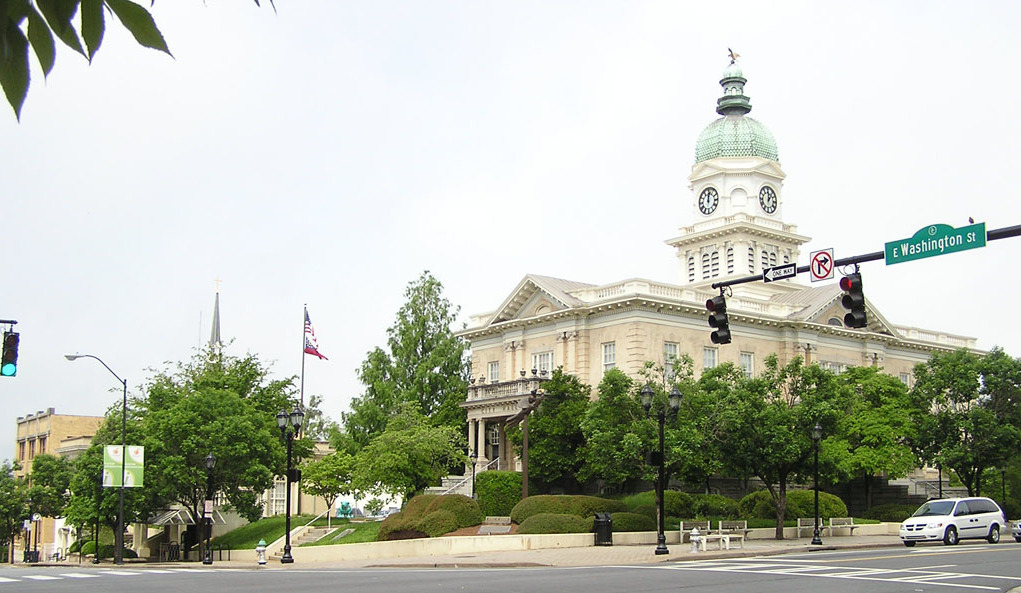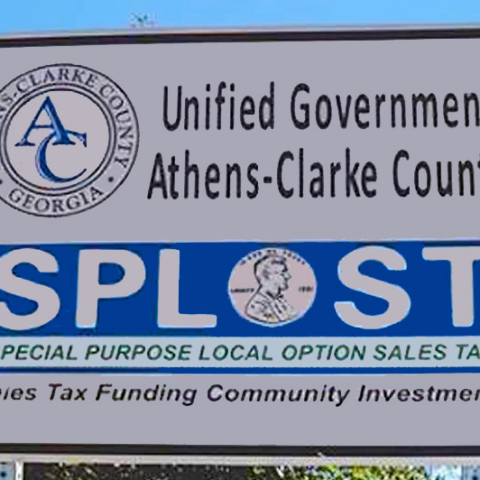By Eli Watkins
Athens, Georgia is an archetypal college town. It is home to a huge university and a vibrant art scene. Athens is a microcosm of Metro Atlanta with a unique, small-town, southern charm. It is also ranked as one of the most unequal towns in the country by income.
Why is it that Athens is one of the most unequal cities in the country? The answer is multifaceted. As a whole, the United States has seen income inequality rise for decades due to the changing nature of employment, lower taxes on the highest earners and massive returns for those in finance and high tech sectors, among other things. Still, Athens stands out above almost all other towns for several reasons. For one, Athens is a college town. By and large, college towns have high levels of income inequality relative to other places. Part of this is a statistical problem, as students who are not truly poor join datasets as if they are. But part of the recorded poverty is very real. Without students added in, Athens remains a poor town with high inequality, more so than most other college towns. Its job opportunities are largely divided between high-paying university jobs, private professional jobs servicing the outlying region and a veritable legion of low-paying service jobs. The story of income inequality in Athens is a complex one, in many ways mirroring the same story playing out across the country, but with its own twist.
“It’s not just going to knock on your door and say, ‘here. You’re going to have to find it yourself.” A local homeless man named Toney said that about economic opportunity in Athens. The “it” he referred to was specifically an opportunity to make a dignified living, a chance to build a sustainable life for oneself and one’s family. While Toney’s circumstances – which are too much of a story in and of themselves to put down here – were certainly unique, his experience with extreme poverty, standing on the sidelines of a wealthy small town, is an important and all-too-common situation to learn about when trying to understand this town. The story of poverty in Athens often goes unacknowledged, or at least unappreciated.
When educated people talk about Athens’ economy, they are almost inevitably bound to hit two main points, both of which offer a glimmer of truth. The first is that on paper Athens, Georgia is one of the poorest and most unequal places in not only the state of Georgia, but perhaps in the entire country. The second point denies the consequence of the first. This second point is that Athens is only poor on paper, and that its thousands of college students explain most of the poverty and inequality because they have little or no income, despite their sometimes privileged backgrounds. Before delving into that second point, one might ask whether proponents of the “poor on paper” viewpoint have really seen much of Athens and all of its clear displays of wealth and poverty.
Do not be mistaken, people dismiss this town’s poverty and inequality statistics for good reason. The thing about economic statistics for college towns is that they generally paint a false picture. College towns across the country have vastly over-reported poverty. For census purposes, students with little or no income fall below the poverty line, but they are usually not actually poor. They come from middle and upper middle class families, attain their degrees and get the hell out of town. People assume Athens is just like all of those other college towns. It is home to the University of Georgia, the oldest public college in the country and the biggest university in the state (for the time being). A sizable student population does skew statistics, making college towns appear poorer and more unequal than they actually are. Athens fits the model of a college town, so it is no surprise that UGA affects the town’s poverty statistics.
So when people say that poverty in Athens is vastly over-reported and not really much of a cause for concern, this might be where they are coming from. And if people said something like that in almost every other college town, they would be right. But Athens is actually a very poor place, despite its frequently picturesque appearance.
“Athens on paper looks much poorer than the rest of the state, much, much poorer. One of the reasons why is because students tend to have zero reported income,” says Matt Hauer, applied demographer at UGA’s Carl Vinson Institute of Government. “Even if we were to pull the students out, Athens still has a very high poverty rate.”
A U.S. Census study published in 2013 accounted for college students in federal poverty statistics. It did find that, yes, college students altered the picture a good deal in college towns, especially so for Athens. But once the study factored out college students, Athens had higher levels of poverty than every other place of comparable population size. Off-campus students caused a twelve percent increase in people living below the poverty level, but without students, the amount of people living below poverty was still almost 27 percent. That was higher than every other place with a population of 100,000 people or more in the study. In most college towns, the students explained a large portion of the town’s poverty. In Athens, the students did not make up even a third of it. The gulf between rich and poor in this town is not the statistical fabrication many have claimed. Athens is a poor town, not just on paper, but also in reality. Drive through its stratified streets or take a harder look at the data to see the evidence behind this claim.
Bishaw chart
It is true that college students account for a good deal of poverty, but they by no means constitute a relatively large portion of poverty (and therefore inequality) statistics in Athens. Without college students, Athens is much poorer than every other college town (U.S. Census, Bishaw)
To stress the point again, Athens is a poor place. Over 80 percent of kids in its public schools are recipients of free or reduced lunch, according to the Georgia Department of Education. There are no college students in those numbers, just families that have settled down and watched their kids grow up, sometimes without enough to eat. This is well above the national rate for free and reduced lunch, which is about 51 percent, and Georgia’s rate, which is above average at around 60 percent. Those are clearly no small figures either. They mean that the government has found that the majority of students in public schools in this country need help getting their next meals. This situation is severe most everywhere, but it is especially so in Athens. Needless to say, it does damage to the town’s workforce. Hungry students will focus on their empty stomachs instead of their classes and worry about their next meal instead of their futures.
Free and reduced lunch chart
For years now, the vast majority of children and teenagers attending public schools in this town have been determined in need of food assistance, a rate much higher than the rest of the state. (Georgia Dept. of Education)
Speaking of that workforce, it is true that Athens has many jobs relative to the state. Although, Georgia as a whole has had close to the highest unemployment figures in the country since the recession and throughout the recovery. But Athens’ relatively high level of employment masks the bifurcated nature of its workforce. Except for the somewhat small amount of solid, blue collar, manufacturing jobs – which, if you have seen an Athenian government official talk about the economy without mentioning the new Caterpillar plant, that was a special occasion indeed – in Athens, opportunities fall into a few divergent categories.
Unemployment chart
For years, Athens has had much lower unemployment than the rest of the state. (Bureau of Labor Statistics)
There are many, many service jobs here. These are jobs, not careers, as Chris Rock has put it. Most of these jobs have low pay, sporadic hours and lack security. People with little to no education can get this work, but a part time job that pays minimum wage or relies on tips is generally not enough to support a family with, especially in the long-term. What is more, applicants have to compete with the teeming masses of college students who need some kind of income. Obviously, college students all have the advantage of satisfactory high school performance that some locals do not.
The other major swath of jobs comes from the University of Georgia. UGA is not only the raison d’être for the town, it is its financial engine. Firstly, there is truth behind the joke that UGA has been under construction since 1783. Its constant revisions and expansions mean it has steady growth and puts out ever more money into Athens’ economy year after year. The university also employs plenty of students. UGA’s food services alone employs approximately 1,100 student employees. But the university obviously does not just employ blue collar and part time workers. It offers hefty incomes to many of its better-known professionals. It is unsurprising that Deanne Rosso, a financial adviser at Vickery Financial Services, a wealth management company tucked into Athens Professional Park, said, “We tend to work with a lot of university clients.” Some of the highest paid people in the state work here. UGA’s head football coach, Mark Richt, has a multimillion-dollar salary. Of course, this might not be too surprising given the importance of football to the school and the fact that the highest paid public employee in the majority of states is a football coach. While Richt stands out, plenty of professors and other coaches also earn incomes well above average.
Finally, there is one more major section of the labor force. These are the professional jobs, the kind with titles, benefits, substantial salaries and real stability. To get these jobs – er, careers – applicants usually need at least one degree and a solid network. If you can make your way into one of these careers, Athens happens to be a great place to do it.
That is because Athens is something of a small metropolitan oasis in a rural region. Atlanta is about an hour and a half away, so people in the surrounding area often need to come to Athens for services. For matters of healthcare, veterinary medicine, law or virtually any other white collar need, Athens is a convenient place to go. This position helps advance many professionals, who can then make their money work for them. Dr. Jeremy Reynolds, a professor at the UGA Department of Sociology, said that increased access to investment opportunities explained much of the increase in the richest people’s incomes. “The way you become wealthy is not by working lots of hours,” said Reynolds, “You make money by having money.”
That, it seems, is something of the key to inequality in not only this city, but most anywhere. Those on the wealthier side of the spectrum ultimately earn money in a different way from those with lower incomes. Many people here have a difficult to nonexistent chance at upward mobility because of the nature of their education, backgrounds and jobs. Plenty of others also have a difficult, but steady, chance to maintain or grow their incomes, and ultimately, their wealth. Athens has wealth, and it has job opportunities, but they are unequally distributed.
So when say, Bloomberg, puts out a gorgeous graphic that says Athens, Georgia has the eighth highest level of inequality in the entire country, it is somewhat deceptive. Is Athens truly among the very poorest and most unequal places in the country? No, but it is still home to serious amounts of poverty and inequality, among the highest for a Georgia Metropolitan Statistical Area, despite the skepticism many people have with that claim. What is more, thanks to its high levels of actual poverty, wealth from UGA and the slew of professional jobs servicing the region, it has deep income inequality. Athens, like many towns in developed countries, has a problem. And yes, its people have to recognize this problem before they can solve it.
MSA Map
Metropolitan statistical areas with the highest GINI indices are frequently located in the south. Note that Athens is among the top 20 poorest cities, although this metric does not account for the college student skewing effect. (US Census, ACS 2013)


